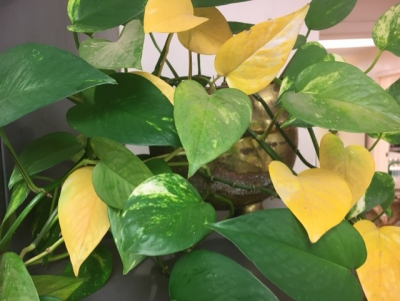Tips for the February Gardener
By Dawn Pettinelli, UConn Home & Garden Education Center

February is a tough time for gardeners. Days are getting longer but the cold temperatures, and in many cases, snow, are keeping us inside. This is a good month to provide houseplants with a little TLC before the weather warms and the gardens beckon.
If possible, bring your plants one by one to the kitchen sink. Give them a thorough grooming by removing any dead or off color leaves. Trim back wayward or undesirable growth. Then give them a good rinsing under the faucet or use a wet cloth to wipe dust off of their leaves. For plants with hairy leaves, like African violets, a soft brush could be used to clean their leaves. Wash their saucers out before setting plants back.
Plants that have outgrown their pots can be repotted at this time. Usually, plants would be moved up to a pot that is an inch or 2 wider. Loosen or trim roots if they are growing in a circle or very dense. An all-purpose potting mix can be used for most plants but specialized mixes for plants like cacti and African violets are also available.
Your amaryllis has probably finished blooming by now. Cut off any spent flowers. Some people like to leave the stem until it yellows as it can photosynthesize but I generally remove the whole stalk after flowering. If you want plants to rebloom next year, the foliage needs light, water and nutrients to grow. Set your plant in a bright location and fertilize monthly starting in March. Plants can be moved outdoors after the danger of frost has passed either in their pots or set them into the ground in a part shady spot. Bring inside in mid-October and let the bulbs go dormant in a dark, warm area for about 8 weeks and then repot for another season of striking trumpet-shaped blooms. Some cultivars do not require a dormant period.
Check on any tender bulbs that you have in storage. Dahlias and tuberous begonias can shrivel if they dry out too much. They are usually stored in some barely moistened peat moss or wood shavings. Sprinkle with a little water if they are on the dry side. Also, this would be a good time to check on any winter squash, potatoes or other vegetables that you’ve been keeping. Use them up before they spoil.
Time spent perusing garden catalogs, either in print or digital format, is a great way to get through cold, winter days. When making out a seed order, don’t forget to note what seeds you have leftover from last year. Most seeds retain their viability for at least a year. It’s always a good idea to plan out the vegetable garden so you know what’s going to be planted where, and when. Last frost dates for your area can be found at: https://garden.org/apps/frost-dates/. The UConn Master Gardener program is offering a Garden Journal with tips on how to plan and maintain your flower and vegetable gardens and plenty of room for you to make notes. To order go to: https://mastergardener.uconn.edu/2024/01/30/garden-journals-available/.
Most of us recognize the benefits of buying local when it comes to produce and other Connecticut grown products but did you know we have at least 5 seed companies in Connecticut. They include Select Seeds (www.selectseeds.com), the Chas. C. Hart Seed Co. (www.hartseed.com), the Heirloom Market at Comstock Ferre selling Baker’s Creek Heirloom Seeds (www.heirloommkt.com), John Scheppers Kitchen Garden Seeds (www.kitchengardenseeds.com), and New England Seed Company (www.neseeds.com). Be sure to see what they have to offer either online or at various retail locations.
If you need a floral fix to get you through to spring, stop by the CT Flower and Garden Show at the Convention Center in Hartford, Feb 22 -25. Visit the UConn Home & Garden Education Center’s booth for a free pH test (bring a half cup of soil) and answers to your gardening questions. A blooming time can also be had at Elizabeth Park’s Greenhouse Bulb and Plant Show, March 1 – 9. Since spring can’t be here soon enough, you’ll just have to go to where the flowers are blooming!
For your gardening questions, feel free to contact us, toll-free, at the UConn Home & Garden Education Center at (877) 486-6271, visit our website at www.homegarden.cahnr.uconn.edu or contact your local Cooperative Extension center.